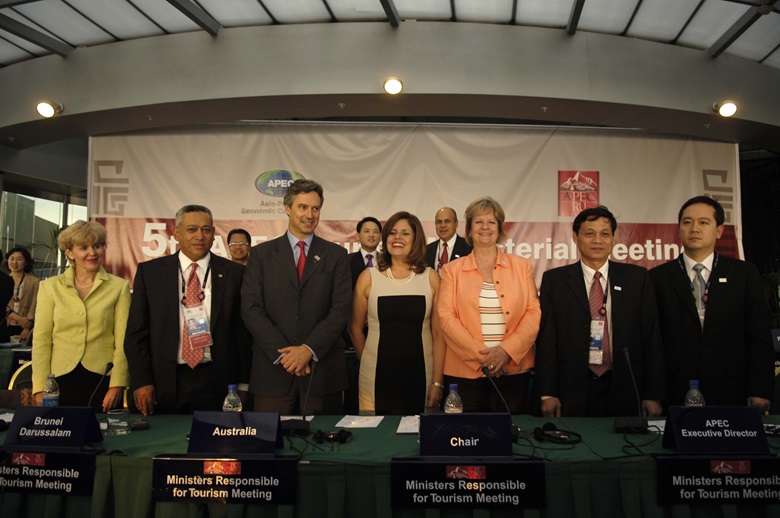-
We, the APEC Tourism Ministers from Australia; Brunei Darussalam; Canada; Chile; the People's Republic of China; the Republic of Indonesia; Japan; the Republic of Korea; Malaysia; Mexico; New Zealand; Peru; the Russian Federation; Republic of Singapore; Chinese Taipei; Kingdom of Thailand; the United States of America; and the Socialist Republic of Viet Nam, met in our Fifth Ministerial Meeting in Lima, Peru, in April 09-11, 2008, under the Chairmanship of HE. Mercedes Araoz, Minister of Foreign Trade and Tourism of Peru.
-
We gather under the theme of PERU APEC 2008 "A new commitment to the development of the Asia-Pacific" knowing that tourism has become one of the major players in international services and a recognized contributor to poverty reduction, representing at the same time one of the main sources of income for many member economies.
-
We strengthen our participation under the theme "Towards responsible tourism in the Asia-Pacific region" to ensure continuous sustainable growth in the tourism industry in order to contribute and generate income and employment to local communities, as well as to promote the conservation and preservation of our environment, including social and cultural aspects.
-
We reaffirm that the four key policy goals adopted in the Seoul Declaration on the APEC Tourism Charter are consistent with the goals for free and open trade and investment established in the Bogor Declaration and the general principles for trade liberalization, facilitation and economic and technical cooperation established in the Osaka Action Agenda.
-
We recognize that the key roles and functions of the Tourism Working Group (TWG) are to facilitate and increase cooperation and learning between TWG members; increase awareness of tourism and its role as an economic driver within the APEC region, throughout the broader APEC forum and in member economies; and influence policy developers and decision makers on issues relating to and impacting on tourism and focus APEC Leaders on tourism.
-
We note the TWG's efforts to be more strategic in its approach to important issues affecting tourism in the region, as well as its valuable structural reform for encouraging the current and future TWG Lead Shepherds to continue the strong leadership and direction of the group.
-
We commend the TWG on its greater efforts to collaborate with other APEC Working Groups such as the Small and Medium Enterprises Working Group (SMEWG), Transportation Working Group (TPTWG) and Human Resources Development Working Group (HRDWG) in order to enhance effective collaboration and participation to reach our main objectives in APEC.
-
We recognize the importance of APEC tourism projects developed and implemented by APEC member economies, encouraging sustainable economic growth of tourism in the Asia-Pacific region and encouraging a greater number of APEC member economies to participate in the presentation and formulation of new projects.
-
We recognize that Responsible Tourism is a vehicle for making environmentally friendly, sustainable and respectful choices when traveling and reducing negative impacts on tourism through the total commitment and participation of stakeholders involved in the tourism industry.
-
We encourage Tourism Organizations of APEC member economies to promote Responsible Tourism through the development of mechanisms to:
-
minimize negative environmental, social and cultural impacts;
-
generate greater economic benefits for local people and enhance the well-being of host communities, by improving working conditions and access to the industry;
-
involve residents as stewards in preserving, developing, promoting and managing cultural and heritage tourism resources as a source of community pride, economic empowerment and well being;
-
make positive contributions to the conservation of natural and cultural heritage and the maintenance of the world's diversity;
-
provide more enjoyable experiences for tourists through more meaningful connections with local people and a greater understanding of social, cultural and environmental issues; and
-
develop a culture of sensitivity and respect between tourists and hosts.
-
We welcome the key discussion points on social inclusion and indigenous tourism, corporate social responsibility, environmental responsibility and climate change, cultural tourism and aviation connectivity as important issues to be developed on the theme "Towards responsible tourism in the Asia-Pacific region".
-
We intend to raise awareness of individuals and communities of the benefits of implementing socially responsible corporate practices.
-
We support the importance of embracing culture in the agenda of the TWG, encouraging APEC economies to develop tourism products which celebrate cultural diversity and provide economic progress for cultural groups; in addition, to entrench culture as an important cross-cutting issue facing APEC, developing practical approaches and solutions for cultural issues in the Asia-Pacific Region.
-
We note the importance of aviation and sufficient airline capacity and the need to ensure that new routes and frequencies are introduced to facilitate tourism and foreign trade.
-
We welcome Peru's support for APEC International Centre for Sustainable Tourism (AICST) ongoing role as TWG's dedicated research agency. Members will consider mechanisms to support AICST to provide continued research support to the TWG and to support its engagement with related organizations including the private sector.
-
We welcome Japan's kind offer to host the 6th Tourism Ministerial Meeting (TMM) in 2010.
-
We congratulate and extend our warm thanks to Peru for its professional and friendly hosting of the 32nd TWG and the 5th TMM. We offer our thanks to our invited guests AICST, World Tourism Organization (UNWTO), and World Travel and Tourism Council (WTTC) for their participation in the 5th TMM. We also thank the APEC Secretariat and the Lead Shepherd for their contribution to the success of the meeting.


